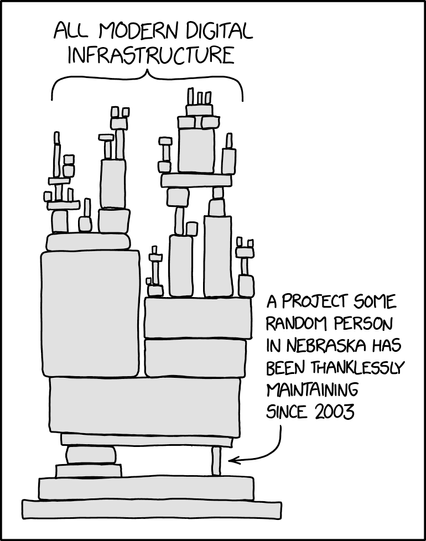In a real sense, OSS is one of the most democratic things humanity has ever done, while also collectively representing far and away the most complex thing it has ever created. That’s actually kind of incredible. The optimism my coworker feels is not about OSS specifically, much less its present state or economics, but about what its existence tells us about Humanity.
I find that to be a remarkable thought.
https://en.wikipedia.org/wiki/Stigmergy
Anarchists been saying this for a century. But it hurts the powerful so they occasionally get massacred like by Stalin in the Spanish civil war.
It is a #postcapitalistisland, as #markfisher said.
From: https://mato.social/@josemurilo/114745315883912492
Ecologia Digital (@josemurilo@mato.social)
The Fediverse is a "#PostCapitalistIsland". "A Space Beyond #CapitalistRealism, as diagnosed by #MarkFisher – the pervasive belief that #capitalism is not only the dominant economic system but the only viable and imaginable one (“It is easier to imagine the end of the world than the end of capitalism”). A “postcapitalist island” is a conceptual or physical space where this stranglehold on the imagination is suspended or broken...alternatives become thinkable and lived." https://josemurilo.com/2025/06/19/mark-fishers-post-capitalist-island/
@djspiewak It's not democratic, there's no voting, it's collectivist, I.e. done for the good of the community (or collective) rather than the the individual. Other examples of collectivism commonly include anarchism, communism, socialism. Not to say open source is any of those things.
It was also consciously done this way, to prevent enclosure of personal property (i.e. your pc) by companies. Open Source is the corp friendly name, but it's really the Free Software movement, free as in Libre.
That people have organized such a staggering amount of labor, produced an even more staggering amount of value, successfully decommodifying whole industry sectors in the process, all without coercion, force, violence, or state power is really incredible.
Its very existence is a living refutation of whole philosophies, and a living affirmation of others.
LLVM is the iconic story there.
@djspiewak I'm new to the free software movement. I wish I'd investigated it 25 years ago. I've spent the past couple months exploring the 40 year history and have found it fascinating and inspiring. The core ideals of freedom and protecting the sharing that naturally comes from the democratic, creative, collaborative process, is deeply inspiring.
Humans cooperating for the common good, working in solidarity to protect and expand one another's freedoms, is us at our very best.
Welcome to anarcho communism in action btw.
FOSS has shaped my life immensly as well. I could not imagine a world without... simply not working.
#Linux and #BSD shaped us all imho.
(And of course all the womderful #FOSS hackers out there and there projects!)
@djspiewak
Also worth noting that this all happened without advertising, in fact it can only happen because advertising didn't get in the way of that democratising process.
People have become conditioned to see #advertising as neutral or even a useful way to fund 'free' stuff. But that's a crucial error.
My contribution being web publishing to a #p2p platform that requires a small one-off payment. So no ongoing fees, no servers to maintain etc: #AutonomiDweb
@djspiewak I remember, 10ish years ago, someone saying that this generation has no moon landing.
The response was "the Linux kernel". While I dream of humans pushing beyond the moon landing, the kernel is far more impressive and impactful.
And it's but one tiny piece of open source creations.
>with the only final arbiter being user adoption.
Isn't this the case for any kind of product though?
It's not like proprietary software companies force people at gunpoint to use proprietary software.
That and some big boys with metal shovels making things like AOSP and the Kernel, sometimes building over what the little ones did.
@djspiewak
I think that only sounds incredible if you believe managers contribute anything.
I don’t.
It’s ok to deputize people to resolve disputes (as happens in OSS and science) but that’s not central planning. But my firm belief is that most management is at best a necessary evil and at worst just an evil.
@djspiewak I think is a little rose-tinted.
Yes, there is no central authority, until there is one. Look at all the foundations creating hierarchies of projects, nation states creating rules that foundations must follow.
Look at the private businesses, governments and NGOs bankrolling developers, including myself, deciding what gets done and what doesn't.
Then you pretty quickly see that user adoption is not final.
IMO the concept of money is more impressive for legos fitting together.
@djspiewak I think that's not the whole story.
Bankrolling often comes from the needs of organizations, and those can diverge from those of individuals.
I hear plenty of stories about the stupid management forcing employees to use braindead software. Or a worker monitor or DRM can be open source but it destroys value for the individual users.
Zoom out: open tracking, analytics. Even Anubis: value for the admins, negative for the users.
The levels up the hierarchy define value for this slice.



